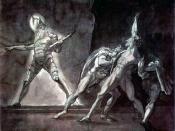The play develops several important themes, the major ones being DISEASE, CORRUPTION, REVENGE, PROCRASTINATION, MADNESS, and POISONING. The following is a set of notes on each of these topics.
1. DISEASE AND CORRUPTION
Through Hamlet the character, the Shakespearean audience experiences the frustration and sadness of a state gone to ruin because of the evil conniving of Claudius. As for Hamlet himself, he suffers a lack of purpose and self-confidence that can't be rectified unless the influence of the evil king is removed. Unfortunately, the agent which is prompting Hamlet to seek his removal is a ghost, and Hamlet himself is reluctant to act because of the possible mischief that the ghost represents. In his anger at failing to put revenge into effect, he curses himself and rails at what fate has allowed to transpire: "O, what a rogue and peasant slave am I"[II.ii.543]; "O cursed spite,/ That ever I was born to set it right."[I.v.187-88];
and "Why, what an ass am I!.../ Must, like a whore, unpack my heart with words, .../And fall a-cursing, like a very drab,/ A scullion! Fie upon't! foh!"[II.ii.578-583]
This self-reproach of Hamlet presents a sickening image to the audience, one of a young man who should be as capable of revenge as any other person of his stature. In fact, young Fortinbras is presented to us early in the play as the model of what a young soldier-prince should be. The killing of Old Fortinbras in single combat by Hamlet's father has bloodied the mind of Young Fortinbras who can barely be restrained in his desire for revenge on Denmark. It is this desire which has put all of Denmark on edge at the beginning of the play, and which Hamlet will come to envy in Young Fortinbras in Act IV, after the...



Hamlet
For just being notes, these are extremely thorough. Good job.
2 out of 4 people found this comment useful.